Iranian Warship Alborz Enters Tumultuous Red Sea

Iran's Alborz warship has entered the Red Sea at a time of soaring tensions on the key shipping route amid the Israel-Hamas war and Houthi attacks on vessels.

Iran's Alborz warship has entered the Red Sea at a time of soaring tensions on the key shipping route amid the Israel-Hamas war and Houthi attacks on vessels.
Iranian state media did not give details of the Alborz's mission but said Iranian warships had been operating in open waters to secure shipping routes, combat piracy and carry out other tasks since 2009.
Yemen's Iran-backed Houthis have been targeting vessels in the Red Sea since November to show their support for the Palestinian Islamist group Hamas in its war with Israel.
In response, many major shipping companies have switched to the longer and more costly route around the Africa's Cape of Good Hope rather than pass through the Suez Canal, which handles about 12% of global trade.
The Alborz warship entered the Red Sea via the Bab al-Mandab Strait, IRGC-affiliated Tasnim news said, without saying when. There were unconfirmed reports on social media it arrived late on Saturday.
The Alvand class destroyer had been a part of the Iranian navy's 34th fleet, alongside the Bushehr support vessel, and patrolled the Gulf of Aden, the north of the Indian Ocean and the Bab Al-Mandab Strait as far back as 2015, according to Iran's state-run Press TV.
The US Fifth Fleet said it could not speak for the Iranian Navy or comment on the unconfirmed reports of the Iranian vessel's movements.
Houthi militants attacked a Maersk container vessel with missiles and small boats on Saturday and Sunday, prompting the company to pause all sailing through the Red Sea for 48 hours.
The head of Iran's Navy, Shahram Irani, was quoted in Iranian media on December 2 as saying that the Alborz was carrying out missions in the Red Sea.
Iran's Defense Minister Mohammad Reza Ashtiani said on December 14 in reference to the Red Sea that "nobody can make a move in a region where we have predominance".
(Report by Reuters)
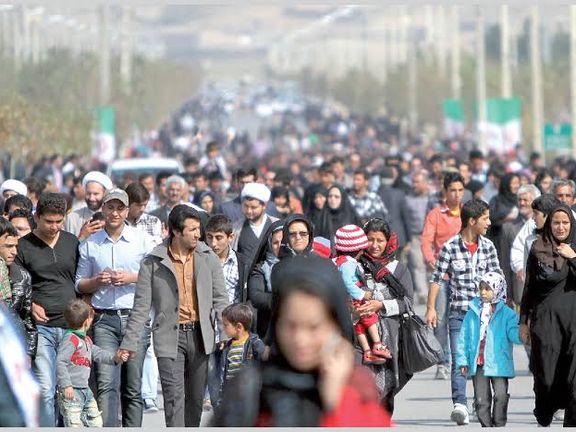
A moderate conservative politician in Iran asserts that the concepts of reformism and conservatism have lost their meaning for the people, struggling for a living.
Former lawmaker Heshmatollah Falahatpisheh told the press that both of the main political factions in Iran have fallen victim to their leaders' opportunism. He charged that leaders of both factions have exploited their members with populist policies that only served their personal interests.
Falahatpisheh did not name anyone in the two leading factions, but Iranian protesters have been voicing their disillusionment and disappointment about conservatives and Reformists in major protests in Iran since 2018 by chanting "It's all over for both reformists and conservatives."
He said that populism and prioritizing personal gains by key politicians have become the perils of political participation at election times. He added that major politicians of both camps can no longer exercise any influence on the voters.
Falahatpisheh further argued that the opportunists have always had short-term interests in politics and never tried to leave a lasting impact on the people's lives. "Their greed for power and wealth has done a lot of damage to the country," he said. To support his point, Falahatpisheh pointed out that the members of both of leading political factions have been involved in major financial corruption cases.
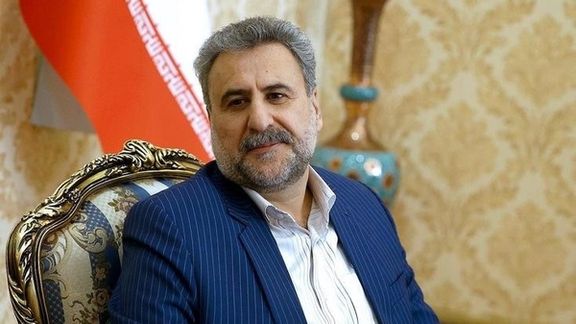
Nonetheless, and although Iranian media commentators and politicians generally believe that there is no room for participation and competition in the upcoming parliamentary election for Iran's reformists, all of whose candidates have reportedly been barred from running for the parliament, still, part of the reform camp, in particular three moderate parties, are keen to take part in the March 1 elections.
This comes while major reformists parties and their leading politicians have said that they are not going to take part in the elections. Reformist leader and former president Mohammad Khatami has said that there is no point in political participation when the regime is not prepared to introduce any change in the political system. Jailed reformist figure Mostafa Tajzadeh has openly talked about boycotting the elections.
According to Nameh News, however, three moderate reformist parties, the Executives of Construction Party led by Hossein Marashi, Neda-ye Iranian Party led by Shahaboddin Tabatabai, and the Moderation and Development Party led by former Vice President Mohammad Bagher Nobakht are determined to nominate their candidates for the upcoming elections.
No well-known reformist or moderate candidates have been allowed to run in the first phase of the vetting by the Interior Ministry, and insiders of the reform camp say there is no one left to run. However, some Reformists say they will look for moderate faces among those whose qualifications will be endorsed by the Guardian Council in January. The Moderation and Development Party which is close to former President Hassan Rouhani says it will name 16 candidates for the list of 30 candidates for the seats that represent Tehran. They probably hope that the other two parties will fill the other 14 slots in the list as well as several others in the provinces.
Although conservative politicians usually dismiss plans and even wishful thinking of the Reformists and moderates to take part in the election, conservative activist Mohammad Ali Pourmokhtar has told Nameh News that conservatives should be weary of a surprise comeback by the reformists.
Pourmokhtar added that Reformists might be able to benefit from the situation if conservatives cannot achieve a consensus among themselves and announce several lists of candidates rather than one.
Such a surprise is not unprecedented. In 1997 when Iranian conservatives and their leaders were almost certain that they were going to win the presidency, a hitherto unknown reformist figure Mohammad Khatami's landslide victory took the entire conservative camp by surprise. In the parliamentary elections, a substantial win means to have around half of the 290 seats at the Majles.
"This is not conceivable at least at this point," a seasoned Iran analyst told Iran International.
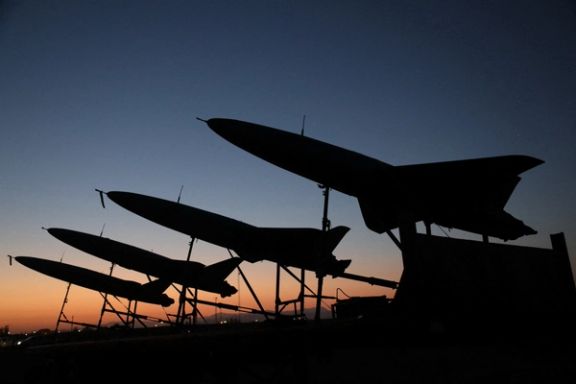
In the run-up to New Year's Day, Ukraine's Air Force reported the deployment of 90 attack drones by Russia, with 87 of them successfully neutralized by Ukrainian air defense systems.
The overnight drone assault specifically targeted port infrastructure in Odessa, resulting in a fire in one of the port terminals, according to Ukraine's military on Monday.
The majority of the deployed drones are supposedly Iranian Shahed kamikaze drones, raising concerns among Western officials and analysts. Recent warnings suggest that Russia may be strategically reserving cruise missile strikes, potentially amassing stockpiles for more extensive assaults during the winter. Since mid-2022, Iran has been a crucial supplier of kamikaze UAVs to Russia, extensively employed for targeting civilian infrastructure and cities.
Priced at approximately $20,000 each, the kamikaze drones were utilized alongside missile attacks to overwhelm Ukrainian air defenses. In response to the relatively inexpensive drones, Ukraine had to deploy more expensive anti-air missiles.
In Lviv, debris from a Russian drone on January 1 ignited a local museum dedicated to the historical figure Roman Shukhevych. Despite the incident, air defenses were active, and residents were advised to seek shelter as Russian UAVs were reportedly identified in the area, with no recorded casualties.
On Friday, Russia initiated a major assault with 122 missiles and 36 drones against Ukrainian targets. The event marked the largest barrage in the 22-month war, resulting in at least 13 civilian casualties. Approximately 88 people were injured, and an unknown number were trapped under rubble during the 18-hour onslaught, according to Ukrainian officials.
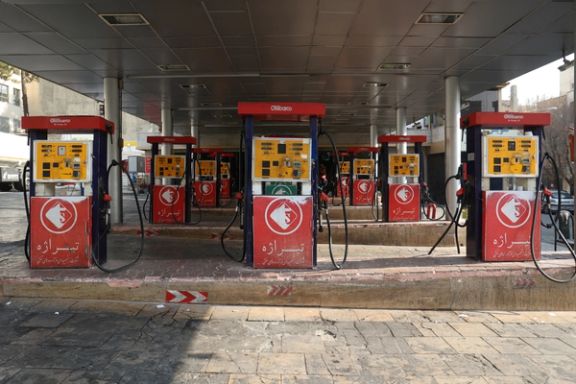
An Iranian parliamentarian claims that the information security cooperation agreement between Iran and Russia is advantageous for Tehran in spite of ongoing cyber attacks.
In a statement to local media, Abolfazl Amouei, a member of the Iranian Parliament and spokesperson for the National Security Commission stated that "Russia is contributing to the cybersecurity of the Islamic Republic of Iran."
The agreement, which focuses on information and intelligence cybersecurity, was proposed by the Iranian government last year. Despite facing accusations of extensive cyber attacks, Iran received parliamentary approval for the bill in December.
The approved bill, originating from an agreement signed three years ago by former Iranian Foreign Minister Mohammad Javad Zarif and Russian Foreign Minister Sergei Lavrov, consists of nine articles. It primarily addresses joint efforts to counter cyber threats, strengthen information security measures, and foster cooperation between the two nations. Notably, the legislation includes a clause specifying the exchange of information and collaborative prosecution of criminal offenses between Iran and Russia.
The deepened political, military, communication, and cyber ties between Tehran and Moscow have elicited concerns among Western nations and their allies. Microsoft's Threat Analysis Center (MTAC) recently issued a warning about potential collaborative efforts by Russia, Iran, and China to influence upcoming elections, including the 2024 United States elections. The warning highlighted the possibility of authoritarian regimes targeting "election infrastructure, campaigns, and voters" through cyber means.
Iran's government networks have been hit multiple times by hacking groups, increasing in the wake of the 2022 uprising, while in December, its gas station networks were hit, reducing activities by 70 percent.

While the UK is preparing for direct strikes against Iran-backed Houthis, who are attacking and hijacking ships in the Red Sea, Tehran denies any involvement.
Iran's Foreign Ministry Spokesman Nasser Kanaani said Monday, “Recent movements by the United States and the United Kingdom in the Red Sea threaten the security of the region.”
The Times reported on Monday that the UK military is gearing up for a series of airstrikes against Yemen's Houthis. The plan involves collaboration with the US and potentially another European country to launch a barrage of missiles at predetermined targets, either in the sea or within Yemen, where the militants are based.
According to British Defense Secretary Grant Shapps, “If the Houthis continue to threaten lives and trade, we will be forced to take the necessary and appropriate action.” Writing in the Daily Telegraph, Shapps said the UK is "willing to take direct action" and "won't hesitate to take further action to deter threats to freedom of navigation in the Red Sea.”
The Times said the UK and US are about to issue an ultimatum against attacking commercial vessels, citing a UK government source as saying that the statement would be a “last warning” and if the Houthis failed to stop the attacks, the response would likely be “limited” but “significant”.
Also on Sunday, British Foreign Secretary David Cameron said he had a phone call with Iranian Foreign Minister Hossein Amir-Abdollahian about the attacks in the Red Sea, “which threaten innocent lives and the global economy.” Cameron said he made clear to his counterpart that “Iran shares responsibility for preventing these attacks, given their long-standing support to the Houthis.”
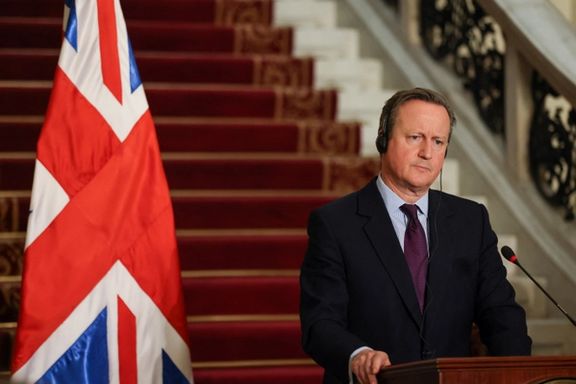
Iran's state media quoted Amir-Abdollahian as saying, "The Israeli regime cannot be allowed to commit massacres of women and children and genocide in Gaza and set the region on fire, while the stopping of a Zionist ship in the Red Sea is seen as endangering the security of this economic waterway." No official readout of the call was released to the media.
During his Monday press conference, Kanaani again denied Tehran’s role in the attacks, despite saying that such accusations by the UK lack substance because the UK has a clear role in the Middle East's long standing crisis. Meanwhile, Iran’s Supreme Leader Ali Khamenei said that the Islamic Republic should continue its support for the “Resistance Front”, referring to the regime’s proxies.
Since the Gaza war broke out on October 7, sparked by Hamas’s invasion of Israel, Iran’s Yemeni proxy announced it would be joining the war on Israel in a bid to force a ceasefire amid Israel's relentless retaliatory attacks. Missiles and drones have been targeting Israeli soil as well as international shipping and US interests. Following the US support of Israel’s right to defend itself in the wake of the October 7 attacks, which saw 1,200 mostly civilians murdered and 240 or more taken hostage, the US has come under further attacks in Iraq and Syria.
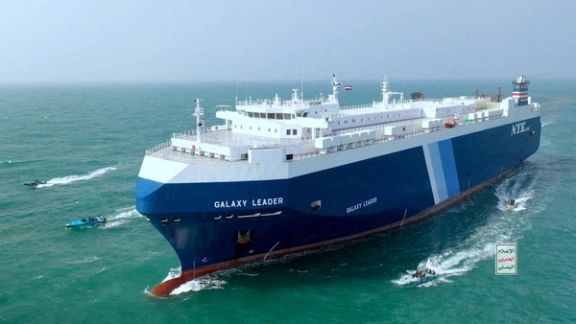
The escalation in the maritime route which accounts for around 12 percent of global trade and oil, connecting Asia to Europe, has led the US to form a more than 20-member international coalition in the face of the aggression, Operation Prosperity Guardian. Several shipping companies have either ceased activity or taken longer routes, causing major delays and costs to journeys.
According to The Times, eight of the 20 ships attacked in the 30 days before Christmas were either UK-registered, had British citizens in their crew or carried goods for the UK.
As the UK and the US reportedly attempt to persuade other European countries to collaborate in forthcoming operations to secure the Red Sea, one of the world's most crucial maritime trade routes, Khamenei’s mouthpiece, the hardliner Kayhan daily proudly proclaimed the success of their "resistance doctrine" on Monday. The paper proclaimed that the region has been transformed and "Soleimanicized", referring to the slain IRGC-Quds force commander seen as the architect of Iran’s network of proxy militias.
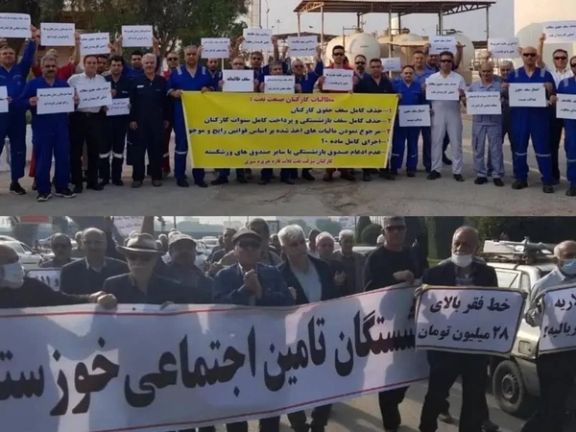
Ongoing labor rights and economic demands have ignited further protests in various sectors across Iran, including retirees and oil and gas employees.
Employees of a petroleum company, affiliated with Iran's Offshore Oil Company in Hormozgan province, gathered once again to voice their dissatisfaction and protest the neglect of their demands.
Likewise, official and contractual employees of the Ministry of Oil, employed at the Aghajari Oil and Gas Exploitation Company, resumed protests against the disregard for their demands including the complete removal of salary caps, elimination of retirement age restrictions, and reimbursement of excess tax deductions.
Prior to this, Iranian oil industry employees had staged strikes, advocating for salary and wage increases to address economic concerns.
In a separate development, workers from the terminals and petrochemical reservoirs in Bandar Mahshahr held a demonstration outside their company's building, protesting the lack of attention to their demands.
Simultaneously, after eight consecutive days of strikes, employees of the Iranian National Steel Industrial Group declared their intention to prolong the strike until their demands, including salary and wage increases, are met.
The trend continued with retirees from the Social Security of Ahvaz and Shush expressing dissatisfaction with poor living conditions and unmet demands, rallying in front of the Social Security Organization and the Governorate building.
Retirees from the steel industry in Mazandaran and Esfahan also gathered in front of the Pension Fund, emphasizing their grievances.
In 2023 alone, Iran has witnessed at least 320 labor-related gatherings and 111 labor strikes, with the majority of protests centered around demands for improved wages and working conditions.